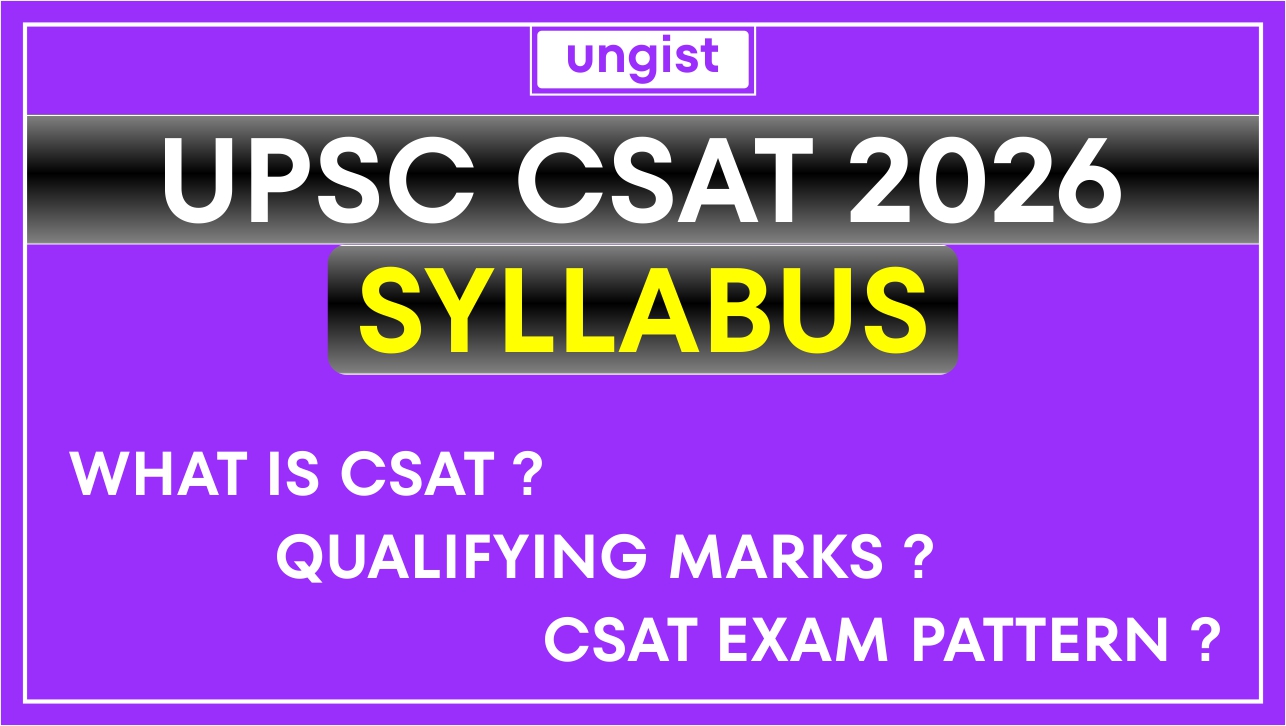UPSC CSAT Syllabus | Exam Pattern & Qualifying Marks
UPSC CSAT Syllabus 2025 - CSAT Full Form, CSAT Qualifying Marks, CSAT Exam Pattern

UPSC CSAT Syllabus | Exam Pattern & Qualifying Marks
If you're preparing for the UPSC Civil Services Examination 2026, understanding the CSAT syllabus is essential. The CSAT (Civil Services Aptitude Test) is Paper II of the prelims and acts as a qualifying paper. Let’s break down the CSAT full form, qualifying marks, syllabus topics, exam pattern, and preparation approach.
What is CSAT in UPSC?
CSAT stands for Civil Services Aptitude Test. Introduced in 2011 as part of the UPSC Preliminary Examination, CSAT tests your comprehension, logical reasoning, mental ability, and numeracy skills. It is designed to ensure that civil services aspirants possess the aptitude and analytical ability required for administrative responsibilities.
CSAT Full Form
CSAT: Civil Services Aptitude Test
UPSC CSAT Syllabus: Section wise Breakdown
Here’s a detailed overview of the seven core areas covered under the CSAT paper:
Comprehension
- This section tests your ability to read, understand, and interpret passages.
- Expect questions that ask you to draw inferences, analyze tone, and identify logical conclusions.
- No prior knowledge is needed; success depends purely on reading comprehension and reasoning ability.
Tip: Practice solving RCs daily and focus on understanding what’s being implied not just what’s stated.
Interpersonal Skills Including Communication Skills
- Tests how well you understand human relationships, behavioral patterns, and communication dynamics.
- Important for aspirants aiming to become effective administrators.
- Questions may be based on real life interaction scenarios or emotional intelligence.
Tip: Focus on understanding
people oriented logic and situational awareness.
Logical Reasoning and Analytical Ability
- Evaluates how critically and rationally you can process information and solve problems.
- Topics include assumptions, conclusions, syllogisms, patterns, analogies, and cause-effect relationships.
Tip: Build a formula free approach and focus on understanding the structure of logic.
Decision Making and Problem Solving
- Focuses on your ability to make fair, balanced, and ethical decisions under pressure.
- Includes situation based questions without negative marking great scoring opportunity if practiced well.
Tip: Consider both practicality and ethical reasoning while solving these questions.
General Mental Ability
- This section includes questions that test mental agility, presence of mind, and overall intelligence.
- Covers puzzles, sequences, clocks, calendars, coding decoding, direction sense, etc.
Tip: Solve PYQs and practice daily to improve speed and accuracy.
CSAT Math Syllabus (Basic Numeracy)
Number system:
- Integers, Rational & Irrational Numbers
- Real Numbers, Divisibility Rules
- Prime & Composite Numbers, HCF & LCM
Arithmetic:
- Percentages, Profit & Loss
- Simple & Compound Interest
- Ratio & Proportion, Averages
- Time & Work, Time-Speed-Distance
Algebra:
- Simple Equations
- Basic Algebraic Identities
Data Interpretation & Data Sufficiency:
- Bar Graphs, Line Graphs, Pie Charts, and Tables
- Interpreting trends and drawing inferences
- Data Sufficiency questions: Can the question be answered from the given data ?
General Mental Ability & Logical Reasoning
Logical Patterns:
- Number & Alphabet Series
- Analogies and Classification
- Venn Diagrams, Coding Decoding
Reasoning & Puzzle Solving:
- Blood Relations
- Direction Sense Test
- Logical Sequences
Analytical Reasoning:
- Syllogisms
- Statement & Assumptions
- Statement & Conclusions
- Statement & Arguments
CSAT Qualifying Marks
- Total Marks: 200
- Questions: 80 (Multiple Choice)
- Qualifying Marks: 33% (i.e., 66 out of 200)
- Negative Marking: Yes, 0.83 marks deducted for each wrong answer
- Time Duration: 2 hours
- Medium: English or Hindi
Book for UPSC CSAT 2026
UNGIST CSAT Book for GS Paper II: This book is designed for UPSC CSAT preparation with:
- Topic-wise theory (formula free approach)
- CSAT Previous year questions (PYQs) from 2011 to 2025
- Practice questions with logical, concept based solutions
Final Thoughts
Though CSAT is qualifying in nature, its increasing complexity means you cannot afford to take it lightly. Prepare each section strategically, especially Numeracy, Reasoning, and Data Sufficiency. Use resources like the UNGIST CSAT Book and stay consistent in your practice.
Want free CSAT PDFs, topic-wise PYQs, and concept classes ?
Visit
ungist.com or follow UNGIST IAS on
YouTube.
Frequently Asked Questions (FAQs)
It emphasizes aptitude, reasoning, comprehension, and basic mathematics.
Yes, you must score at least 33% (66 marks) to qualify.
Yes, with consistent practice and conceptual clarity. UNGIST also offers a self-paced book and free YouTube classes.
Focus on understanding logic over formulas. Practice easy-to-moderate level problems regularly.
As of now, no changes have been announced. Stay updated via UPSC notifications.
